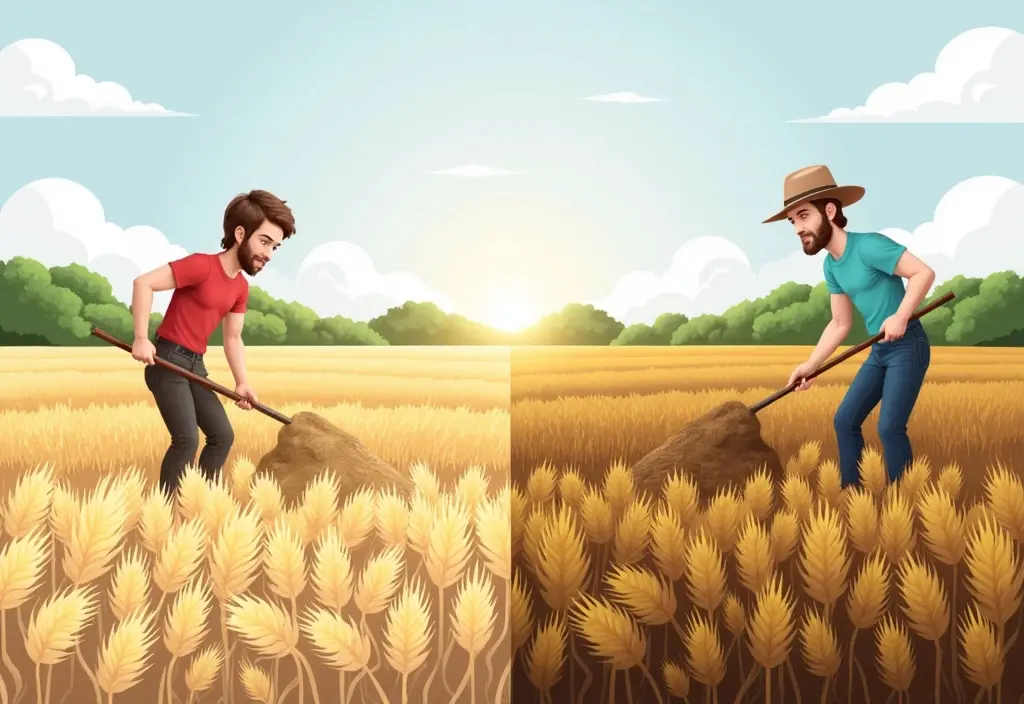We see it all the time. Someone blows past you on the highway, weaving through traffic, only for you to see them pulled over a few miles later. You can’t help but smile. “Karma.” A coworker who thrives on gossip is suddenly the target of a vicious rumor. A friend might whisper, “Well, what goes around, comes around.” The idea is simple. It’s satisfying. Do good, and good things will come back to you. Do bad, and the universe will eventually settle the score. It feels like a law of nature. But as a person of faith, I’ve had to stop and ask myself, what the Bible says about karma.
Is this popular idea actually a biblical one?
Many Christians will point you straight to Galatians 6:7. “Do not be deceived: God cannot be mocked. A man reaps what he sows.” At first glance, it sounds exactly like karma. Cause and effect. You get what you give. But when you dig deeper, you find that the biblical principle of sowing and reaping is worlds away from the Eastern concept of karma. It’s a truth that isn’t rooted in an impersonal cosmic law, but in the character of a very personal God. It’s a principle about farming, consequences, and a grace so powerful it can shatter the entire equation.
More in Ethics & Morality Category
What the Bible Says About Gluttony
What the Bible Says About Guilt
Key Takeaways
- The word “karma” does not appear anywhere in the Bible. It is a concept originating from Eastern religions like Hinduism and Buddhism.
- The closest biblical parallel to karma is the principle of “sowing and reaping,” most famously stated in Galatians 6:7.
- Sowing and reaping differs from karma in key ways: it involves a personal God, not an impersonal law; it is based on a single lifetime, not reincarnation; and its cycle can be broken by God’s grace and forgiveness.
- While God’s forgiveness through Jesus Christ removes our eternal condemnation, it does not always remove the natural, earthly consequences of our actions.
- The principle of sowing and reaping is not a transactional formula for health and wealth but a broader spiritual principle about character, influence, and eternal outcomes.
Is “Karma” a Christian Concept in Disguise?
First things first: the word “karma” is nowhere to be found in the Bible. It’s a Sanskrit word that means “action” or “deed,” and it’s a core teaching in Hinduism and Buddhism. At its heart, karma is the spiritual law of cause and effect. Your intentions and your actions directly influence your future. And this doesn’t just apply to this life. Karma is tied hand-in-glove with reincarnation, the belief that a soul is reborn into a new body after death. The sum of your deeds in this life—and in past ones—shapes the circumstances of your next.
So, if the word isn’t biblical and the theology of reincarnation isn’t Christian, why the confusion?
It all comes down to a powerful metaphor the Bible uses again and again: sowing and reaping. It’s a farming analogy so simple and universal that anyone can get it. You plant tomato seeds, you get tomatoes. You don’t get pumpkins. If you plant nothing, you get nothing. The harvest is always tied to the seed. This is the very principle the Apostle Paul is highlighting for the Galatians.
So, What Exactly Does “Reaping What You Sow” Mean in the Bible?
When Paul wrote to the churches in Galatia, he wasn’t writing a philosophical treatise. He was addressing a huge problem. False teachers had worked their way into the church, telling non-Jewish believers they had to follow Jewish law, especially circumcision, to be saved. Paul’s response is a fiery, passionate defense of salvation by grace through faith in Christ alone. The whole letter is about freedom from legalism and learning to live by the Holy Spirit.
That’s the backdrop for this famous passage.
Galatians 6:7-9 says, “Do not be deceived: God is not mocked, for whatever one sows, that will he also reap. For the one who sows to his own flesh will from the flesh reap corruption, but the one who sows to the Spirit will from the Spirit reap eternal life. And let us not grow weary of doing good, for in due season we will reap, if we do not give up.”
Paul is setting up a stark choice. He’s saying that our daily decisions—our “sowing”—matter. We can either invest in our own sinful desires (the “flesh”), a path that leads to decay. Or we can invest in the things of God (the “Spirit”), a path that leads to eternal life. It’s a challenge to live a life that matches the faith you claim to have. You can’t say you follow Jesus while living a life that ignores him, thinking you can pull one over on God. That, Paul says, is just mocking God.
I learned this lesson the hard way in my twenties. I went to church and called myself a Christian, but I was sowing seeds of neglect in my friendships. I was busy, focused on my career, and just assumed my friends would always be there. I’d let texts go unanswered for days. I’d cancel plans last minute. For a while, it worked. But slowly, the invitations stopped coming. The calls got further apart. Then a crisis hit my life, and I suddenly felt profoundly alone. It wasn’t God punishing me. It was the natural, predictable harvest from the seeds I had planted. My actions had consequences. It was a painful, powerful illustration of Paul’s point.
How is Sowing and Reaping Really Different From Karma?
This is the most important question. The two ideas look alike, but their foundations are on different planets. It’s like the difference between a photograph of a person and the actual person. They look the same, but one is a flat image, and the other is alive.
Does God Even Play a Role?
In the system of karma, the universe itself is the judge and jury. Karma is an impersonal, automatic law, like gravity. Gravity doesn’t care if you’re a good person; if you jump, you fall. There’s no appeal. The law just works. You act, and a reaction follows, maybe today, maybe in the next life. It’s a closed system.
The Bible flips that script entirely. Why? Because God is at the very center of it. Notice Paul’s wording: “God is not mocked.” He is the one who sees the sowing. He is the one who ensures the harvest. This isn’t an indifferent law; it’s the design of a personal Creator. Our choices matter because we make them before a holy, loving God. It’s about a relationship, not an equation.
What About Reincarnation and Past Lives?
As we covered, karma relies on the cycle of rebirth, or samsara. The goal is to build up enough good karma to finally break free from this cycle and reach a state of enlightenment. The consequences of your actions might not show up in this lifetime, but they could determine if you come back as a prince or a pauper.
The Bible presents a radically different timeline. One. Single. Life. Hebrews 9:27 puts it bluntly: “…it is appointed for man to die once, and after that comes judgment.” There are no second chances, no new bodies. Our actions in this life have eternal weight. We aren’t sowing for a better position in the next earthly life; we are sowing for eternity.
Can You Ever Truly Escape the Consequences?
Under karma, every single debt gets paid. Every negative act must be balanced, whether through personal suffering or countless lifetimes of good deeds. There’s no mercy built into the system. The cosmic scales have to be balanced.
This is where the Christian message offers a hope that changes everything. It’s the gospel. The Bible teaches that even though we have all sown bad seeds and deserve a harvest of decay, God stepped in. He made a way to wipe the slate clean. That way is Jesus Christ.
The heart of Christianity is grace. Grace is getting what you don’t deserve. Karma says you get what you earn. Grace says God gives you what Jesus earned. On the cross, Jesus reaped the harvest of corruption that we had sown and paid our debt. 2 Corinthians 5:21 puts it this way: “For our sake he made him to be sin who knew no sin, so that in him we might become the righteousness of God.” Forgiveness through faith in Christ shatters the karmic cycle. It balances the scales not with our work, but with His.
If God Forgives Me, Do My Problems Just Disappear?
Here’s where it gets complicated for many of us. If I’m forgiven, why do I still deal with the fallout from my mistakes? If my eternal destiny is secure, why is my life on earth still so hard sometimes?
This is the crucial difference between eternal pardon and earthly consequences. God’s forgiveness through Christ removes the ultimate, eternal punishment for our sin. We are made right with him. Our eternal fate is secure. But the natural, real-world consequences of our actions don’t always vanish.
Think about it. A man drives drunk and causes a horrible accident. He can turn to God, repent, and receive total forgiveness for that sin. His relationship with God is restored. But that doesn’t un-injure the people he hit. It doesn’t fix the cars he totaled. It doesn’t make his legal troubles go away. He is forgiven, but the consequences remain in this world.
I walked this out myself a few years back. I got suckered into a “get rich quick” scheme pitched by a friend. I sowed seeds of greed and impatience, ignoring all the red flags and pouring money I couldn’t afford to lose into it. Of course, it crashed and burned. I lost everything I put in. The shame was crushing. I confessed my foolishness to God and truly felt His forgiveness.
But the next morning, the money wasn’t back in my account. The debts were still there. My eternal standing was secure, but I still had to walk through the earthly harvest of my choices. It took me years of disciplined work to recover. Grace didn’t erase the consequence; it gave me the strength to get through it.
This pattern is all over Scripture. King David is the prime example. After his adultery with Bathsheba and arranging her husband’s murder, the prophet Nathan confronted him. David’s repentance was deep and genuine. Nathan told him, “The LORD has taken away your sin; you shall not die” (2 Samuel 12:13). Forgiven! But in the very next sentence, Nathan detailed the earthly consequences: “Nevertheless, because by this deed you have utterly scorned the LORD, the child who is born to you shall die.” The dysfunction and heartbreak that plagued David’s family for generations were a direct harvest of those seeds, even though David himself was forgiven by God.
What Do Other Parts of the Bible Say About This Principle?
Galatians 6:7 might be the most famous “sowing and reaping” verse, but the principle itself is a thread that runs through the entire Bible.
Can We See This Teaching in the Old Testament?
Absolutely. The Old Testament constantly reminds us that choices have consequences.
- Proverbs 22:8: “Whoever sows injustice will reap calamity, and the rod of his fury will fail.”
- Hosea 8:7: “For they sow the wind, and they shall reap the whirlwind.” This was a warning to Israel that their small spiritual compromises would lead to a harvest of total disaster.
- Job 4:8: “As I have seen, those who plow iniquity and sow trouble reap the same.”
What Did Jesus Himself Have to Say?
Jesus loved to use agricultural metaphors. His teachings are full of seeds, soil, and harvests.
He applied the principle directly to generosity in Luke 6:38: “Give, and it will be given to you. Good measure, pressed down, shaken together, running over, will be put into your lap. For with the measure you use it will be measured back to you.”
His teaching on fruit-bearing in Matthew 7:16-20 is the same idea from a different angle. “By their fruit you will recognize them… every good tree bears good fruit, but a bad tree bears bad fruit.” The “fruit” of your life is the harvest that shows what kind of “seed” is in your heart.
So How Can I Start Sowing Good Seeds in My Life?
This is where theology becomes practical. This principle isn’t meant to make us live in fear of messing up. It’s a call to live with intention, empowered by God’s Spirit. Paul gives us the positive side of the coin: “The one who sows to the Spirit will from the Spirit reap eternal life. And let us not grow weary of doing good, for in due season we will reap, if we do not give up” (Galatians 6:8-9).
This is our call to action. What does sowing to the Spirit look like?
- Sowing in Relationships: Choose to sow seeds of encouragement, forgiveness, and listening instead of criticism or gossip.
- Sowing in Your Mind: Choose to fill your mind with Scripture and things that build you up instead of media that fuels anxiety and greed.
- Sowing With Your Resources: Choose to sow seeds of generosity with your time and money instead of using them only for yourself.
- Sowing in Your Habits: Choose to sow seeds of discipline in prayer, health, and work instead of laziness and indulgence.
Every single day is a field. Every choice is a seed. And the promise is that if we keep planting, a harvest is coming.
Is Reaping and Sowing a Guarantee of Health and Wealth?
It is vital to shut down a dangerous distortion of this principle: the Prosperity Gospel. This teaching twists sowing and reaping into a transaction. It claims that if you sow a “seed” of faith (usually money), God is obligated to give you a “harvest” of health and wealth.
This is a terrible misreading that turns God into a slot machine. It ignores the story of Job, a righteous man who lost everything. It ignores the life of the Apostle Paul himself, who was beaten, shipwrecked, and imprisoned. His harvest wasn’t worldly comfort. It was something infinitely better. For more on this, you can explore theological resources from institutions like Yale Divinity School that delve into the complexities of suffering and faith.
The ultimate harvest promised in Galatians is “eternal life.” It’s a harvest of character, joy, and peace with God that begins now and lasts forever. Sometimes that includes earthly blessings. But often, the greatest harvest is the one that grows inside us as we become more like Christ.
The Final Harvest: Grace Wins
So, what does the Bible say about karma?
It says the world isn’t run by an impersonal law, but by a personal God. It says our choices matter immensely. It says that actions have consequences; you reap what you sow.
But it also says something karma could never say.
It says that for all the bad seeds we’ve planted, for the rotten harvest we all deserve, a loving Farmer stepped into our field. He took that dying crop on Himself and offered us a new seed to plant in its place—His own righteousness.
The principle of sowing and reaping is very real. But for those in Christ, the final harvest isn’t about getting what we deserve. It’s about receiving a grace we could never earn.
FAQ – What the Bible Says About Karma

Does God’s forgiveness mean my earthly problems will just disappear?
No, God’s forgiveness through Jesus Christ removes eternal punishment, but it does not always remove worldly consequences. For example, forgiveness doesn’t undo legal issues, physical harm, or financial losses caused by our actions. Christians can trust that God’s grace will sustain them through the earthly harvest of their choices.
How is the biblical teaching on sowing and reaping different from karma’s cause-and-effect system?
The Bible teaches that God, a personal and loving Creator, is directly involved in the consequences of our actions. Unlike karma, which is an automatic and impersonal law, biblical sowing and reaping involves God’s oversight and the possibility of grace, forgiveness, and breaking the cycle.
What does ‘reaping what you sow’ mean in the Bible?
In the Bible, ‘reaping what you sow’ means that our daily decisions and actions have natural consequences. Investing in sinful desires leads to decay, while investing in the Spirit leads to eternal life. It emphasizes personal responsibility and living according to God’s will.
Is the concept of karma mentioned in the Bible?
No, the word ‘karma’ does not appear anywhere in the Bible. It is a concept originating from Eastern religions like Hinduism and Buddhism, which involves cause and effect and reincarnation.
What biblical principle is similar to karma, and how is it different?
The biblical principle similar to karma is ‘sowing and reaping,’ most famously stated in Galatians 6:7. Unlike karma, which is based on an impersonal law, sowing and reaping involves a personal God who oversees the consequences of our actions and can break the cycle through grace and forgiveness.




